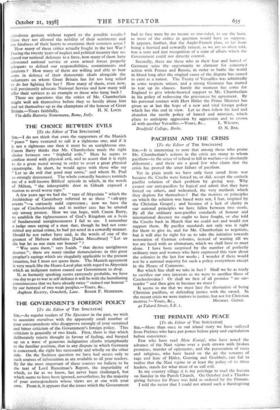PACIFISM AND THE CRISIS [To the Editor of TILE SPECTATOR]
SIR,—h is interesting to note that among those who praise Mr. Chamberlain's actions in the crisis are many to whom pacifism—in the sense of refusal to kill in warfare—is absolutely abhorrent ; and there are a good few who claim that the crisis has proved the utter failure of pacifism.
Yet in plain truth we have only been saved from war because the Czechs were forced to, or did, accept the entirely pacifist solution of their problem by giving way. Why cannot our anti-pacifists be logical and admit that they have forced on others, and welcomed, the very methods which they deplore for themselves ? But the motives or principles on which the solution was based were not, I fear, inspired by the Christian Gospel ; and because of a lack of clarity in our national principles we have fallen between two stools. By all the ordinary non-pacifist standards of honour and international decency we ought to have fought, or else told the Czechs back in March that we could not and would not support them. By pacifist standards not only was it right for them to give in, and for Mr. Chamberlain to negotiate, but it will also be right for us to take the initiative towards restoration of German colonies, instead of waiting till we too are faced with an ultimatum, which we shall have to meet alone. I have been surprised by the number of perfectly ordinary men and women who have expressed this view about the colonies in the last few weeks ; I wonder if there would not be a national majority for such a policy everywhere except in the House of Commons.
But which line shall we take in fact ? Shall we be as ready to sacrifice our own interests as we were to sacrifice those of Czechoslovakia ? Or shall we first of all promise " no sur- render " and then give in because we must ?
It seems to me that we must face the alternative of being Christian pacifists, or defending justice with the sword. In the recent crisis we were traitors to justice, but not for Christian















































 Previous page
Previous page